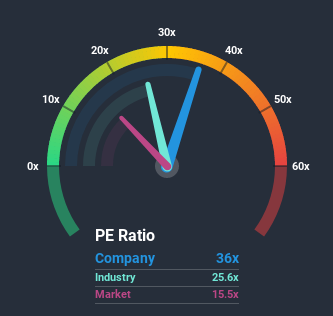Some Shareholders Feeling Restless Over Cochlear Limited's (ASX:COH) P/E Ratio

Want to participate in a short research study? Help shape the future of investing tools and earn a $40 gift card!
With a price-to-earnings (or "P/E") ratio of 36x Cochlear Limited (ASX:COH) may be sending very bearish signals at the moment, given that almost half of all companies in Australia have P/E ratios under 15x and even P/E's lower than 9x are not unusual. Although, it's not wise to just take the P/E at face value as there may be an explanation why it's so lofty.
With earnings growth that's superior to most other companies of late, Cochlear has been doing relatively well. The P/E is probably high because investors think this strong earnings performance will continue. If not, then existing shareholders might be a little nervous about the viability of the share price.
Check out our latest analysis for Cochlear
Does Cochlear Have A Relatively High Or Low P/E For Its Industry?
We'd like to see if P/E's within Cochlear's industry might provide some colour around the company's particularly high P/E ratio. It turns out the Medical Equipment industry in general also has a P/E ratio significantly higher than the market, as the graphic below shows. So it appears the company's ratio could be influenced considerably by these industry numbers currently. Ordinarily, the majority of companies' P/E's would be lifted firmly by the general conditions within the Medical Equipment industry. We'd highlight though, the spotlight should be on the anticipated direction of the company's earnings.
If you'd like to see what analysts are forecasting going forward, you should check out our free report on Cochlear.
Does Growth Match The High P/E?
Cochlear's P/E ratio would be typical for a company that's expected to deliver very strong growth, and importantly, perform much better than the market.
Retrospectively, the last year delivered an exceptional 16% gain to the company's bottom line. Pleasingly, EPS has also lifted 47% in aggregate from three years ago, thanks to the last 12 months of growth. So we can start by confirming that the company has done a great job of growing earnings over that time.
Shifting to the future, estimates from the analysts covering the company suggest earnings should grow by 1.8% per year over the next three years. Meanwhile, the rest of the market is forecast to expand by 12% each year, which is noticeably more attractive.
With this information, we find it concerning that Cochlear is trading at a P/E higher than the market. Apparently many investors in the company are way more bullish than analysts indicate and aren't willing to let go of their stock at any price. There's a good chance these shareholders are setting themselves up for future disappointment if the P/E falls to levels more in line with the growth outlook.
The Bottom Line On Cochlear's P/E
Using the price-to-earnings ratio alone to determine if you should sell your stock isn't sensible, however it can be a practical guide to the company's future prospects.
We've established that Cochlear currently trades on a much higher than expected P/E since its forecast growth is lower than the wider market. Right now we are increasingly uncomfortable with the high P/E as the predicted future earnings aren't likely to support such positive sentiment for long. Unless these conditions improve markedly, it's very challenging to accept these prices as being reasonable.
Before you take the next step, you should know about the 2 warning signs for Cochlear (1 is significant!) that we have uncovered.
If P/E ratios interest you, you may wish to see this free collection of other companies that have grown earnings strongly and trade on P/E's below 20x.
This article by Simply Wall St is general in nature. It does not constitute a recommendation to buy or sell any stock, and does not take account of your objectives, or your financial situation. We aim to bring you long-term focused analysis driven by fundamental data. Note that our analysis may not factor in the latest price-sensitive company announcements or qualitative material. Simply Wall St has no position in any stocks mentioned.
Have feedback on this article? Concerned about the content? Get in touch with us directly. Alternatively, email editorial-team@simplywallst.com.

